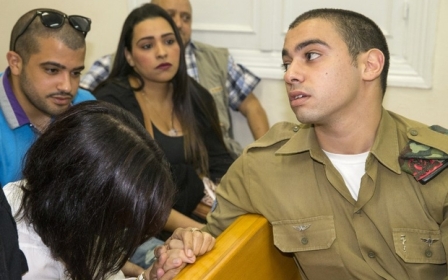Israeli soldier who shot wounded Palestinian in head to be released

An Israeli soldier controversially convicted of manslaughter for shooting dead a Palestinian had his sentence reduced by a third by a military parole board on Monday.
Elor Azaria was initially sentenced to 18 months in prison in 2017, but Israeli military chief of staff Gadi Eisenkot later reduced the term by four months.
The parole board said he is now due to be released on 10 May. It did not provide details of its ruling on Azaria, who was 19 at the time of the shooting in 2016.
Azaria killed Abdel Fattah Yusri Abdel Fattah al-Sharif, a 20-year old Palestinian who stabbed an Israeli soldier in the Tel Rumieda neighbourhood of Hebron on 24 March 2016.
Al-Sharif was shot by Israeli soldiers and wounded. Ramzi Aziz al-Tamimi al-Qasrawi, a 21-year-old, who tried to stab Israeli soldiers along with Sharif was shot dead.
Some 11 minutes after the initial shooting, Azaria, a sergeant and military medic at the time of the incident, shot Sharif in the head as he lay wounded on the ground.
Translation: The moment, one of the occupation soldiers execute the martyr Abdel Fattah Al-Sharif by shooting him in the head while he lay on the ground in Hebron
A video released by B'Tselem, an Israeli NGO that documents human rights violations against Palestinians, showed Azaria shooting Sharif in the head without any apparent provocation.
Azaria said that at the time he "feared Al-Sharif was wearing an explosive belt and could blow himself up," a claim judges rejected.
Israel detained Sharif's body for almost two months, preventing his family from burying him according to Muslim tradition.
Azaria began serving his sentence on 9 August last year and will have served less than a year in prison on his release.
His trial captivated Israel and highlighted deep divisions in public opinion between those who denounced the shooting and others who said it was justified.
Top military brass strongly denounced Azaria's actions, but right-wing politicians, including Prime Minister Benjamin Netanyahu, called for him to be pardoned.
It also highlighted rifts between Ashkenazi and Mizrahi Jews in Israeli society.
Azaria, a Mizrahi Jew whose family originate from Yemen, was seen as a victim of discrimination by the Ashkenazi-Jewish elite in Israeli society against those from Arab countries.
Some Israeli critics saw Azaria's Arab background as a reason he was tried in front of an Israeli court, while suggesting that if he had been Ashkenazi he would not have been tried.
Ashkenazis, who come mainly from Europe, control Israel's political, business, legal and military establishment.
New MEE newsletter: Jerusalem Dispatch
Sign up to get the latest insights and analysis on Israel-Palestine, alongside Turkey Unpacked and other MEE newsletters
Middle East Eye delivers independent and unrivalled coverage and analysis of the Middle East, North Africa and beyond. To learn more about republishing this content and the associated fees, please fill out this form. More about MEE can be found here.




